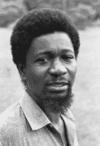- Soyinka, Wole
-
in full Akinwande Oluwole SoyinkaNigerian playwright.After studying in Leeds, Eng., he returned to Nigeria to edit literary journals, teach drama and literature at the university level, and found two theatre companies. His plays, written in English and drawing on West African folk traditions, often focus on the tensions between tradition and progress. Symbolism, flashback, and ingenious plotting contribute to a rich dramatic structure. His serious plays reveal his disillusionment with African authoritarian leadership and with Nigerian society as a whole. His works include A Dance of the Forests (1960), The Lion and the Jewel (1963), Death and the King's Horseman (1975), and From Zia, with Love (1992). He has written several volumes of poetry; his best-known novel is The Interpreters (1965). A champion of Nigerian democracy, he was repeatedly jailed and exiled. In 1986 he became the first black African to be awarded the Nobel Prize for Literature.
 Wole Soyinka.Vernon L. Smith
Wole Soyinka.Vernon L. Smith* * *
▪ Nigerian authorin full Akinwande Oluwole Soyinkaborn July 13, 1934, Abeokuta, NigeriaNigerian playwright and political activist who received the Nobel Prize for Literature in 1986. He sometimes wrote of modern West Africa (Western Africa) in a satirical style, but his serious intent and his belief in the evils inherent in the exercise of power usually was evident in his work as well.A member of the Yoruba people, Soyinka attended Government College and University College in Ibadan before graduating in 1958 with a degree in English from the University of Leeds in England. Upon his return to Nigeria, he founded an acting company and wrote his first important play, A Dance of the Forests (produced 1960; published 1963), for the Nigerian independence celebrations. The play satirizes the fledgling nation by stripping it of romantic legend and by showing that the present is no more a golden age than was the past.He wrote several plays in a lighter vein, making fun of pompous, Westernized schoolteachers in The Lion and the Jewel (first performed in Ibadan, 1959; published 1963) and mocking the clever preachers of upstart prayer-churches who grow fat on the credulity of their parishioners in The Trials of Brother Jero (performed 1960; published 1963) and Jero's Metamorphosis (1973). But his more serious plays, such as The Strong Breed (1963), Kongi's Harvest (opened the first Festival of Negro Arts in Dakar, 1966; published 1967), The Road (1965), From Zia, with Love (1992), and even the parody King Baabu (performed 2001; published 2002), reveal his disregard for African authoritarian leadership and his disillusionment with Nigerian society as a whole.Other notable plays include Madmen and Specialists (performed 1970; published 1971), Death and the King's Horseman (1975), and The Beatification of Area Boy (1995). In these and Soyinka's other dramas, Western elements are skillfully fused with subject matter and dramatic techniques deeply rooted in Yoruba folklore and religion. Symbolism, flashback, and ingenious plotting contribute to a rich dramatic structure. His best works exhibit humour and fine poetic style as well as a gift for irony and satire and for accurately matching the language of his complex characters to their social position and moral qualities.From 1960 to 1964 Soyinka was coeditor of Black Orpheus, an important literary journal. From 1960 onward he taught literature and drama and headed theatre groups at various Nigerian universities, including those of Ibadan, Ife, and Lagos. After winning the Nobel Prize, he also was sought after as a lecturer, and many of his lectures were published—notably the Reith Lectures of 2004, as Climate of Fear (2004).Though he considered himself primarily a playwright, Soyinka also wrote novels—The Interpreters (1965) and Season of Anomy (1973)—and several volumes of poetry. The latter include Idanre, and Other Poems (1967) and Poems from Prison (1969; republished as A Shuttle in the Crypt, 1972), published together as Early Poems (1998); Mandela's Earth and Other Poems (1988); and Samarkand and Other Markets I Have Known (2002). His verse is characterized by a precise command of language and a mastery of lyric, dramatic, and meditative poetic forms. He wrote a good deal of Poems from Prison while he was jailed in 1967–69 for speaking out against the war brought on by the attempted secession of Biafra from Nigeria. The Man Died (1972) is his prose account of his arrest and 22-month imprisonment. Soyinka's principal critical work is Myth, Literature, and the African World (1976), a collection of essays in which he examines the role of the artist in the light of Yoruba mythology and symbolism. Art, Dialogue, and Outrage (1988) is a work on similar themes of art, culture, and society. He continued to address Africa's ills and Western responsibility in The Open Sore of a Continent (1996) and The Burden of Memory, the Muse of Forgiveness (1999).Soyinka was the first black African to be awarded the Nobel Prize for Literature. An autobiography, Aké: The Years of Childhood, was published in 1981 and followed by the companion pieces Ìsarà: A Voyage Around Essay (1989) and Ibadan: The Penkelemes Years: A Memoir, 1946–1965 (1994). In 2006 he published another memoir, You Must Set Forth at Dawn. In 2005–06 Soyinka served on the Encyclopædia Britannica Editorial Board of Advisors.Additional ReadingDerek Wright, Wole Soyinka Revisited (1993), discusses Soyinka's life and works. Analyses of his writings include James Gibbs (ed.), Critical Perspectives on Wole Soyinka (1980); Obi Maduakor, Wole Soyinka (1987); James Gibbs and Bernth Lindfors (eds.), Research on Wole Soyinka (1993); and Tanure Ojaide, The Poetry of Wole Soyinka (1994).* * *
Universalium. 2010.
